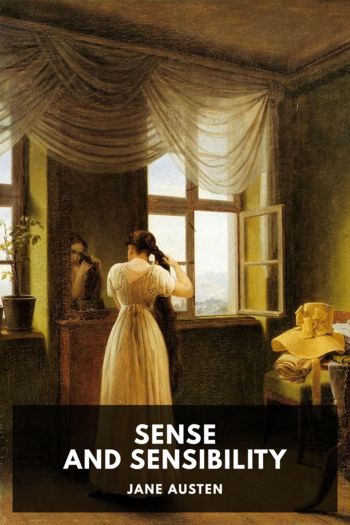Sense and Sensibility - Jane Austen (classic literature list txt) 📗

- Author: Jane Austen
Book online «Sense and Sensibility - Jane Austen (classic literature list txt) 📗». Author Jane Austen
The night was cold and stormy. The wind roared round the house, and the rain beat against the windows; but Elinor, all happiness within, regarded it not. Marianne slept through every blast; and the travellers, they had a rich reward in store, for every present inconvenience.
The clock struck eight. Had it been ten, Elinor would have been convinced that at that moment she heard a carriage driving up to the house; and so strong was the persuasion that she did, in spite of the almost impossibility of their being already come, that she moved into the adjoining dressing-closet and opened a window shutter, to be satisfied of the truth. She instantly saw that her ears had not deceived her. The flaring lamps of a carriage were immediately in view. By their uncertain light she thought she could discern it to be drawn by four horses; and this, while it told the excess of her poor mother’s alarm, gave some explanation to such unexpected rapidity.
Never in her life had Elinor found it so difficult to be calm, as at that moment. The knowledge of what her mother must be feeling as the carriage stopped at the door—of her doubt—her dread—perhaps her despair!—and of what she had to tell!—with such knowledge it was impossible to be calm. All that remained to be done was to be speedy; and, therefore staying only till she could leave Mrs. Jennings’s maid with her sister, she hurried downstairs.
The bustle in the vestibule, as she passed along an inner lobby, assured her that they were already in the house. She rushed to the drawing-room—she entered it—and saw only Willoughby.
XLIVElinor, starting back with a look of horror at the sight of him, obeyed the first impulse of her heart in turning instantly to quit the room, and her hand was already on the lock, when its action was suspended by his hastily advancing, and saying, in a voice rather of command than supplication—
“Miss Dashwood, for half an hour—for ten minutes—I entreat you to stay.”
“No, sir,” she replied with firmness, “I shall not stay. Your business cannot be with me. The servants, I suppose, forgot to tell you that Mr. Palmer was not in the house.”
“Had they told me,” he cried with vehemence, “that Mr. Palmer and all his relations were at the devil, it would not have turned me from the door. My business is with you, and only you.”
“With me!”—in the utmost amazement—“well, sir—be quick—and if you can—less violent.”
“Sit down, and I will be both.”
She hesitated; she knew not what to do. The possibility of Colonel Brandon’s arriving and finding her there, came across her. But she had promised to hear him, and her curiosity no less than her honor was engaged. After a moment’s recollection, therefore, concluding that prudence required dispatch, and that her acquiescence would best promote it, she walked silently towards the table, and sat down. He took the opposite chair, and for half a minute not a word was said by either.
“Pray be quick, sir,” said Elinor, impatiently; “I have no time to spare.”
He was sitting in an attitude of deep meditation, and seemed not to hear her.
“Your sister,” said he, with abruptness, a moment afterwards—“is out of danger. I heard it from the servant. God be praised! But is it true? is it really true?”
Elinor would not speak. He repeated the inquiry with yet greater eagerness.
“For God’s sake tell me, is she out of danger, or is she not?”
“We hope she is.”
He rose up, and walked across the room.
“Had I known as much half an hour ago—But since I am here,”—speaking with a forced vivacity as he returned to his seat—“what does it signify? For once, Miss Dashwood—it will be the last time, perhaps—let us be cheerful together. I am in a fine mood for gaiety. Tell me honestly,” a deeper glow overspreading his cheeks, “do you think me most a knave or a fool?”
Elinor looked at him with greater astonishment than ever. She began to think that he must be in liquor;—the strangeness of such a visit, and of such manners, seemed no otherwise intelligible; and with this impression she immediately rose, saying—
“Mr. Willoughby, I advise you at present to return to Combe—I am not at leisure to remain with you longer. Whatever your business may be with me, it will be better recollected and explained tomorrow.”
“I understand you,” he replied, with an expressive smile, and a voice perfectly calm; “yes, I am very drunk. A pint of porter with my cold beef at Marlborough was enough to overset me.”
“At Marlborough!” cried Elinor, more and more at a loss to understand what he would be at.
“Yes—I left London this morning at eight o’clock, and the only ten minutes I have spent out of my chaise since that time procured me a nuncheon at Marlborough.”
The steadiness of his manner, and the intelligence of his eye as he spoke, convincing Elinor, that whatever other unpardonable folly might bring him to Cleveland, he was not brought there by intoxication, she said, after a moment’s recollection—
“Mr. Willoughby, you ought to feel, and I certainly do, that after what has passed, your coming





Comments (0)